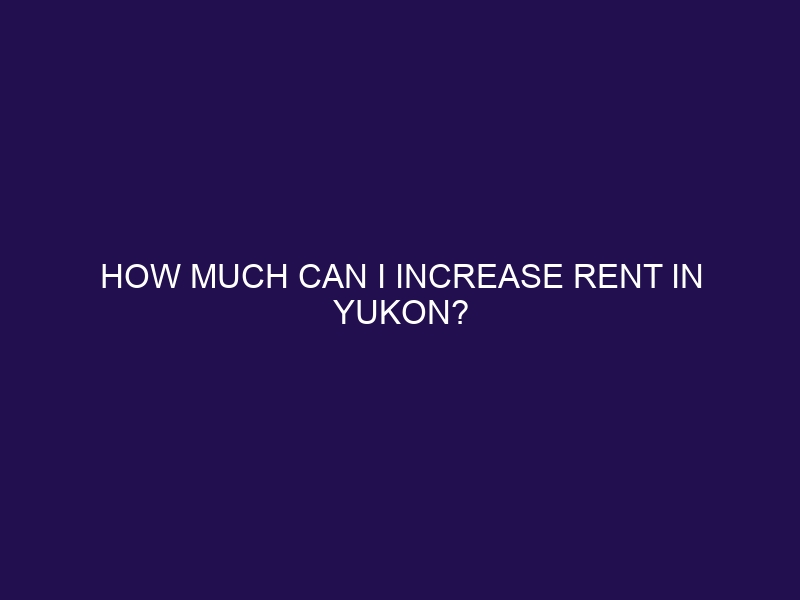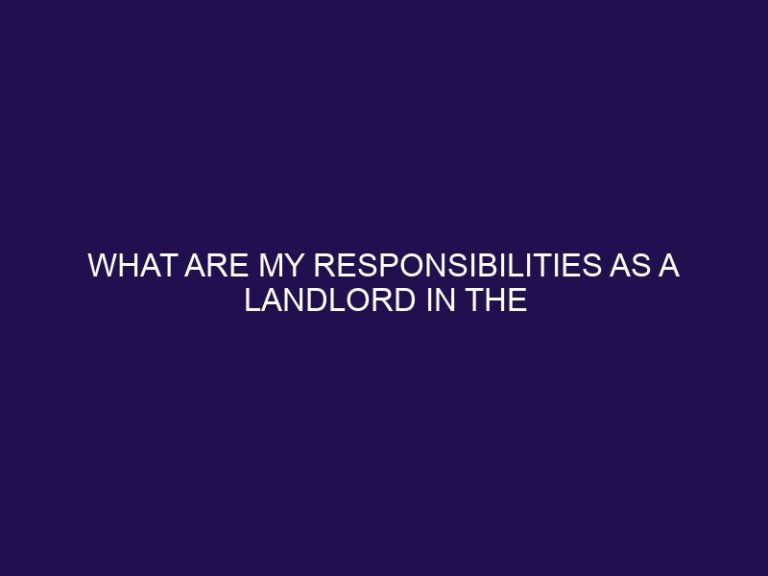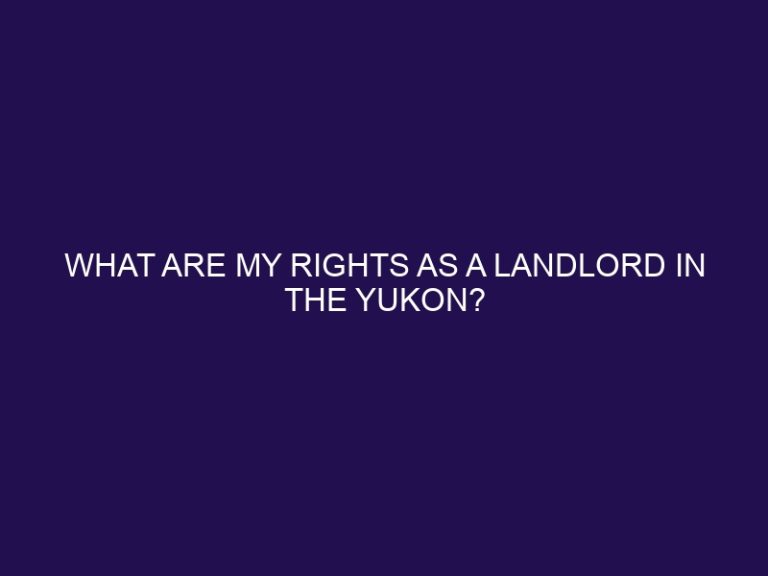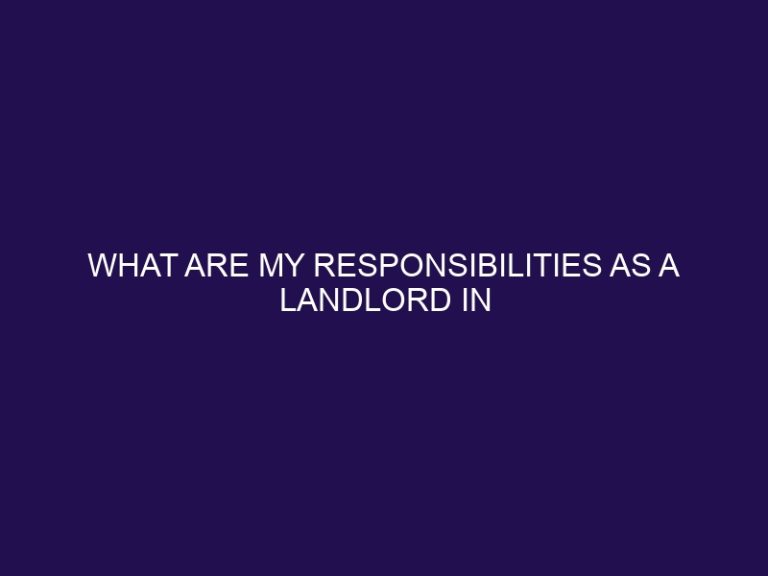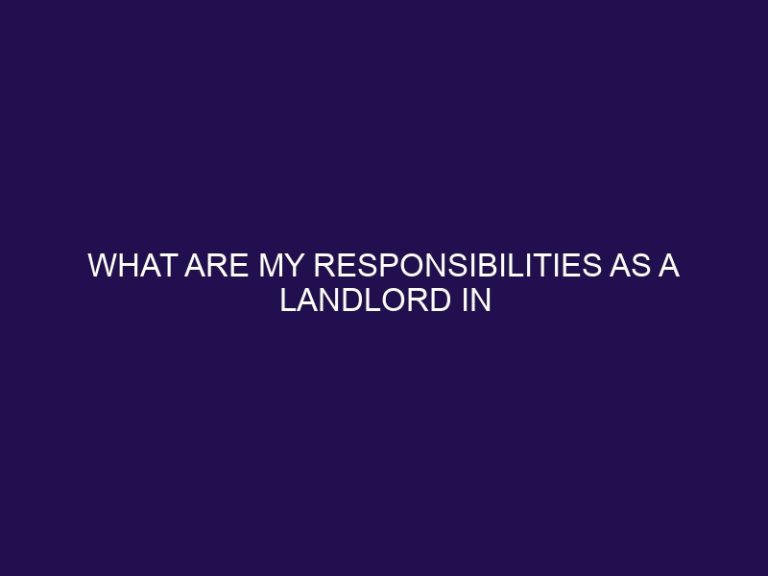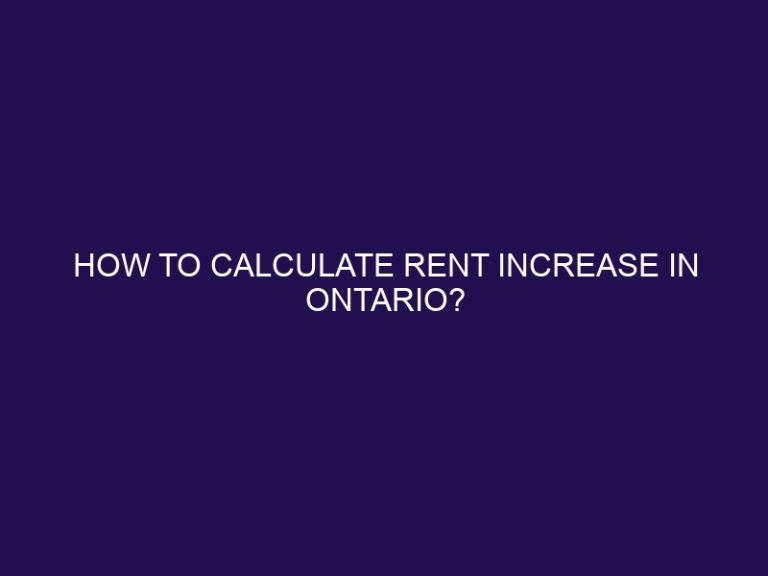How much can I increase rent in Yukon?
.jpg)
html
When it comes to increasing rent in Yukon, it’s essential for landlords to understand the regulations and guidelines in place to ensure compliance and maintain a fair and transparent rental market. The Yukon Rental Board has established specific rules governing rent increases, protecting the rights of both tenants and landlords.
One of the key aspects to comprehend is the overview of rent increase regulations in Yukon. This will provide a general understanding of the framework that governs rent increases in the territory. Furthermore, it is crucial to be familiar with the rent increase guidelines that landlords must adhere to when considering raising the rent for their properties.
To gain a deeper understanding of the legal requirements, it is important to address questions such as:
- What are the laws and regulations regarding rent increase in Yukon?
- What is the maximum percentage allowed for rent increase?
- Do rent increase rules vary in different locations within Yukon?
Considering these factors and having the necessary knowledge of the rules and regulations is crucial before proceeding with any rent increase. It ensures that both landlords and tenants are aware of their rights and responsibilities.
In the following sections, we will explore the factors landlords should consider before increasing rent, the step-by-step process to follow for a rent increase in Yukon, what to do if a tenant disputes a rent increase, and additional considerations for landlords regarding proper notice requirements and legal consequences for violating rent increase regulations. By understanding and following these guidelines, landlords can navigate the rent increase process effectively while maintaining a harmonious landlord-tenant relationship.
Key takeaways:
- Rent increase regulations in Yukon: Familiarize yourself with the laws and regulations surrounding rent increases in Yukon to ensure compliance and avoid legal issues.
- Maximum percentage allowed: Be aware of the maximum percentage by which you can increase rent in Yukon to avoid violating the law and maintain a positive landlord-tenant relationship.
- Considerations before increasing rent: Evaluate factors such as the current rental market conditions, property condition, and rent increase history before deciding on a rent increase to make informed decisions that benefit both parties.
Overview of Rent Increase Regulations in Yukon
Rent increase regulations in Yukon provide protections for tenants and ensure fair and reasonable rent adjustments. Here is an overview of Rent Increase Regulations in Yukon:
- Annual Rent Increase: Landlords can increase the rent once every 12 months, and the maximum allowable increase is based on the Consumer Price Index (CPI) and set by the Residential Tenancies Office.
- Notice Required: Landlords must provide tenants with at least 3 full months’ written notice before implementing a rent increase.
- Dispute Resolution: If tenants believe the rent increase is unreasonable, they can apply for dispute resolution through the Residential Tenancies Office.
- Exception: Some rental properties, such as those under market rent regulation, may have different rules for rent increases.
In 2019, the Yukon government introduced additional measures to protect tenants, including stricter guidelines for rent increases and improved affordability initiatives to address the housing crisis. These regulations aim to create a more stable and balanced rental market for both tenants and landlords.
Understanding Rent Increase Guidelines in Yukon
When considering rent increases in Yukon, it’s crucial to understand the guidelines set by the government. Understanding the rent increase guidelines in Yukon is essential to ensure a positive landlord-tenant relationship. In Yukon, landlords must follow specific rules when raising rental rates, which are designed to protect tenants from significant and unjustified increases. These guidelines take into account factors such as inflation and the average rental rates in the area. By familiarizing yourself with and understanding these guidelines, you can guarantee that you are charging a fair and reasonable rent increase. Remember, it’s always a good idea to consult the Residential Tenancies Branch for the most up-to-date information on rent increases in Yukon.
What Are the Laws and Regulations Regarding Rent Increase in Yukon?
In Yukon, what are the laws and regulations regarding rent increase? There are specific guidelines that landlords must adhere to when considering raising the rent for their tenants. According to these regulations, the government determines the maximum percentage allowed for rent increase each year. These rules do not vary in different locations within Yukon, ensuring consistency across the territory. It is crucial for landlords to take into account factors such as current rental market conditions, the condition of the property, and the rent increase history before making any decisions. In the event that a tenant disputes a rent increase, there are tenant’s rights and options available to them, and any disputes can be resolved through proper channels. It is of utmost importance for landlords to be fully aware of the legal consequences that arise from violating rent increase regulations.
What is the Maximum Percentage Allowed for Rent Increase?
The maximum percentage allowed for rent increase in Yukon depends on the specific guidelines set by the Residential Tenancies Office. What is the Maximum Percentage Allowed for Rent Increase? While the exact percentage may vary, landlords are typically allowed to increase rent by a certain percentage each year. It is important for landlords to familiarize themselves with the current regulations and guidelines to ensure compliance. Factors such as market conditions and the condition of the property may also influence the maximum percentage allowed for rent increase. If tenants have concerns or disputes regarding a rent increase, they have rights and options to address the issue through the Residential Tenancies Office.
Do Rent Increase Rules Vary in Different Locations within Yukon?
Rent increase rules in Yukon do not vary based on location within the territory. The maximum percentage allowed for rent increase is determined by the government and applies uniformly across all areas of Yukon. Landlords must adhere to these regulations when raising rental prices, regardless of the specific location of the property. This ensures that tenants are protected from unfair and excessive rent hikes. Rent increase guidelines in Yukon aim to maintain affordable and stable housing options for all residents, regardless of where they live within the territory.
Rent increase rules in Yukon do not vary in different locations within the territory. The government determines the maximum percentage allowed for rent increase, which applies uniformly across all areas of Yukon. Landlords must follow these regulations when raising rental prices, irrespective of the specific location of the property. This ensures that tenants are safeguarded against unfair and excessive rent hikes. The rent increase guidelines in Yukon aim to uphold affordable and stable housing options for all residents, regardless of their location within the territory.
Factors to Consider before Increasing Rent in Yukon
Raising the rent in Yukon? Take a moment to consider some crucial factors beforehand. The current rental market conditions, the condition of the property, and the rent increase history all play a significant role. Dive into these sub-sections to gain insights that will help you make an informed decision. Stay tuned to discover the key elements that shape the rent landscape in Yukon and maximize your return on investment.
Current Rental Market Conditions
The current rental market conditions in Yukon are an essential factor to consider before increasing rent. It is crucial to assess the demand and supply of rental properties in the area. If the market is highly competitive, with a low vacancy rate and high demand, landlords may have more leverage to increase rent. Conversely, in a market with high vacancy rates and low demand, landlords may need to be cautious about raising rents to avoid losing tenants. Understanding the current rental market conditions allows landlords to make informed decisions and remain competitive in the market.
Fact: As of 2021, the rental vacancy rate in Yukon was 2.2%, indicating a relatively tight rental market.
Condition of the Property
Considering the condition of the property is crucial before increasing rent in Yukon. Here are some factors to assess:
- Maintenance: Determine if any repairs or upgrades are needed to justify a rent increase based on the condition of the property.
- Amenities: Analyze the quality and availability of amenities in the property, such as laundry facilities, parking, or outdoor spaces, taking into account the condition of the property.
- Appliances: Evaluate the condition and functionality of appliances provided to tenants as part of the property.
- Accessibility: Consider factors like proximity to public transportation, schools, and shops, which can affect the desirability of the property and its overall condition.
For instance, a landlord in Yukon increased the rent for a property after renovating the kitchen and bathroom with modern fixtures. The improved condition of the property attracted tenants who were willing to pay a higher rent for the upgraded amenities.
Rent Increase History
Rent increase history is a crucial aspect to take into account when considering a rent hike in Yukon. It is essential to carefully examine previous rent increases to avoid excessive rises and potential conflicts with tenants. By analyzing the rental market conditions and past adjustments, landlords can determine a reasonable percentage for adjusting the rent. This ensures compliance with Yukon’s regulations regarding rent increases and helps prevent any legal repercussions. Moreover, landlords should also consider the property’s condition and various other rental property factors before implementing a rent increase. Properly assessing these aspects will contribute to maintaining positive relationships with tenants and fostering a fair renting environment.
Step-by-Step Process to Increase Rent in Yukon
- Follow this step-by-step process to increase rent in Yukon:
- Begin by reviewing the current rental agreement to ensure it allows for rent increases.
- Next, check the Residential Tenancies Act in Yukon for specific regulations and guidelines.
- Provide written notice to the tenant, clearly stating the intention to increase the rent and the effective date.
- Calculate the maximum allowable increase based on the guidelines set by the Residential Tenancies Office.
- Make sure to deliver the notice at least three months before the requested increase.
- Keep a record of all communication and provide necessary documentation to support the increase.
- Lastly, be prepared to negotiate or discuss the increase with the tenant if necessary.
What to Do If a Tenant Disputes a Rent Increase
If a tenant disputes a rent increase in Yukon, it can be a challenging situation to navigate. In this section, we’ll explore what tenants can do when faced with this issue. We’ll look at their rights and options, as well as the process for resolving rent increase disputes in Yukon. So, if you’re a tenant unsure about how to handle a rent increase, keep reading to learn how to protect your rights and reach a fair resolution.
Tenant’s Rights and Options
- Review the lease agreement and understand the terms and conditions for Tenant’s Rights and Options.
- Check if the proposed rent increase is within the legal limit set by the Rent Increase Guidelines in Yukon, to ensure Tenant’s Rights and Options.
- If the increase is above the allowed percentage, tenants can negotiate with the landlord to find a mutually agreeable solution for Tenant’s Rights and Options.
- If an agreement cannot be reached, tenants have the right to dispute the rent increase by filing a complaint with the Residential Tenancies Office, which protects their Tenant’s Rights and Options.
- The Residential Tenancies Office will then conduct a hearing and make a decision based on the evidence provided by both parties, ensuring Tenant’s Rights and Options are upheld.
- If the decision favors the tenant, the rent increase may be adjusted or denied, thus safeguarding their Tenant’s Rights and Options.
- If the decision favors the landlord, tenants can choose to accept the increase or decide to vacate the property, exercising their Tenant’s Rights and Options.
By being aware of their Tenant’s Rights and Options, tenants in Yukon can navigate rent increase situations with confidence.
Resolving Rent Increase Disputes in Yukon
Resolving rent increase disputes in Yukon involves following a step-by-step process and understanding tenants’ rights and options. Here is a list of steps to resolve such disputes:
- Communicate with the tenant: Discuss the reasons for the rent increase and address any concerns or questions.
- Review rental agreement: Verify if the rent increase complies with the terms of the current agreement.
- Provide notice: Give the tenant proper written notice of the rent increase, adhering to the required time frame.
- Consider negotiation: Explore the possibility of reaching a compromise or alternative solution.
- Mediation: If a resolution cannot be reached, consider engaging in mediation with the tenant and a neutral third party.
- Legal action: As a last resort, consult with a lawyer and file a dispute resolution application with the Residential Tenancy Office.
Additional Considerations for Landlords in Yukon
When it comes to being a landlord in Yukon, there are a few additional factors that you need to keep in mind. In this section, we’ll dive into the legal consequences that landlords may face if they violate the rent increase regulations. We’ll also explore other crucial considerations that you should be aware of when managing a rental property. So, buckle up and get ready to navigate the landlord landscape in Yukon with confidence.
Legal Consequences for Violating Rent Increase Regulations
Violating rent increase regulations in Yukon can result in legal consequences for landlords. As per the guidelines, landlords must strictly adhere to the maximum percentage allowed for rent increase, which is currently set at 2%. Failure of landlords to comply with these regulations may lead to penalties, such as fines or even facing legal action from tenants. It is crucial for landlords to fully understand the laws and regulations concerning rent increase in Yukon in order to avoid any violations. By taking proactive measures to stay well-informed and compliant with these regulations, landlords can maintain a positive relationship with tenants and steer clear of any potential legal repercussions.
Other Rental Property Considerations
Other Rental Property Considerations for landlords in Yukon include:
|
It is essential to stay informed about the regulations and laws regarding rental properties in Yukon to ensure compliance and maintain a successful rental business.
Some Facts About How Much Can I Increase Rent in Yukon:
- ✅ Rent increases in Yukon are capped at five percent, regardless of inflation. (Source: Our Team)
- ✅ Existing renters in Yukon benefit from a 1.8 percent reduction in inflation-adjusted rent. (Source: Our Team)
- ✅ The rent control regulations in Yukon ban evictions “without cause” unless the landlord or a family member will occupy the unit. (Source: Our Team)
- ✅ Landlords in Yukon may face rising costs due to the implementation of rent control. (Source: Our Team)
- ✅ Small-time landlords in Yukon may choose to sell their rental units to homeowners instead, potentially limiting options for future tenants. (Source: Our Team)
Frequently Asked Questions
How much can I increase rent in Yukon?
In Yukon, rent increases are capped at five percent, regardless of inflation. This means landlords cannot increase the rent by more than five percent, even if the Consumer Price Index (CPI) indicates a higher inflation rate.
What is the rent cap in Yukon?
The rent cap in Yukon limits rent increases to one percent, based on the Consumer Price Index (CPI) for Whitehorse in 2020. This rent cap was implemented as part of the government’s agreement with the NDP.
Can landlords evict tenants without cause in Yukon?
The new rent control regulations in Yukon ban evictions “without cause” unless the landlord or a family member will occupy the unit. However, there is no legal definition of “immediate family,” so cases will be reviewed by a government official.
Is the rent cap in Yukon negatively affecting landlords?
Some landlords in Yukon have expressed concerns about the rent cap, claiming they will no longer be able to afford their properties. These landlords argue that the rent freeze may force them to sell their rental properties.
What are the potential consequences of rent control in Yukon?
Rent control in Yukon, according to economists, may have unintended consequences such as decreased affordability and negative effects on surrounding neighborhoods. It may also lead to small-time landlords facing more challenges, being stuck with problematic tenants, and being exposed to political risk.
What is the duration of the rent cap in Yukon?
The rent cap in Yukon is currently scheduled to expire in 2023. Before the rent cap expires, the government has ample time to review and make any necessary changes to rental legislation based on the outcomes and impacts of the cap.

